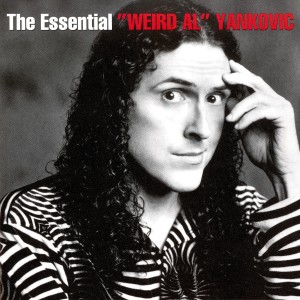“Weird Al” Yankovic – The Essential “Weird Al” Yankovic Legacy 88697-58543-2 (2009)
Weird Al has forged a career much longer than anyone would have guessed when he first started making parody songs in conjunction with the Dr. Demento radio show. The essential character of his music has been to appeal to individuals, mostly young men, whose aspirations and expectations extend beyond their realistic chances for social advancement in life. He appeals to people with more time and (pop) cultural interests than money, whose lives tend to be dominated by people and forces outside their control — his career tracks pretty closely a time when a gap expanded between worker productivity and real compensation and his popularity came when the gap proved to be a real long-term trend (plus his biggest commercial successes were after the 2007-08 financial crash around the time this collection was released). His humor tends to play on an awareness of the base and trifling nature of consumer pop culture. It kind of stops there though. He winks with his audience in making fun of trashy mass media artifacts, all the while resigning himself to the dictates of that mass media and all its whims. Al’s music kind of resigns itself to the pop culture ghetto, and in many respects breeds dependency on it.
He performed parody songs but also wrote original comedy songs. Those who like Weird Al best always express a fondness for his originals. Some of this songs are more medleys of popular songs, done in a novelty manner. Take “Polka on 45” (from his second album In 3D). He does a medley of mostly pop/rock songs played as polkas with his accordion. This sort of mashup of the “hip”, contemporary pop with passé and all-to-ethnic polka might be compared to some of Robert Mapplethorpe‘s photography, or other such “high” art, but no one does. Al gets a laugh from the incongruity of throwing the different styles together that normally appeal to mutually exclusive audiences who listen to certain genres of music to separate themselves from the other genres, obliterating those attempts at social distinction. “One More Minute” (from his third, and maybe best album Dare to Be Stupid) is a retro rock/doo-wop romantic put-down tune in the style of The Mothers of Invention (like “Go Cry on Somebody Else’s Shoulder” from Freak Out!), but pushed to absurdist extremes in its lyrical exaggerations.
Over time, Al kind of got formulaic. That isn’t to say his music ever got bad. But the early material was something a little new. There were no guarantees that it would be popular, any more than a passing fad. Al’s kind of self-aware musical irony was a way to normalize and humanize the vacuousness of pop culture. Over time, that seemed less daring and more of a favor to the institutions of the music industry. There are many stories of celebrity musicians being proud that Weird Al parodied one of their songs. That sort of confirms Al’s insider status. This was the same problem the pop/punk band DEVO faced.
Weird Al is kind of a great musician for kids to listen to, because his self-awareness provides good lessons for young people. Yet adults should, in theory, kind of move on to deeper, more informed critiques of pop culture. That isn’t to say this music can’t be enjoyed by grown-ups. It can. This collection, which was selected by Al himself, if nothing else proves how good Al’s band was, how astute his awareness of the nuances of pop culture was (including which songs were worth parodying), and how his broad humor managed to avoid quickly dated jokes based on easily-forgotten current events. This particular collection isn’t exhaustive, and it omits multiple albums. But it still makes a decent introduction to his career.


